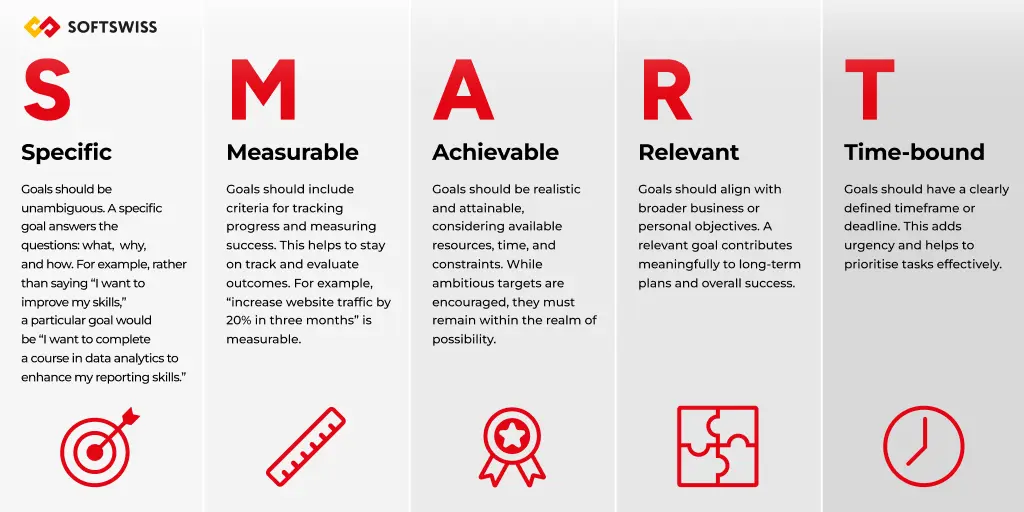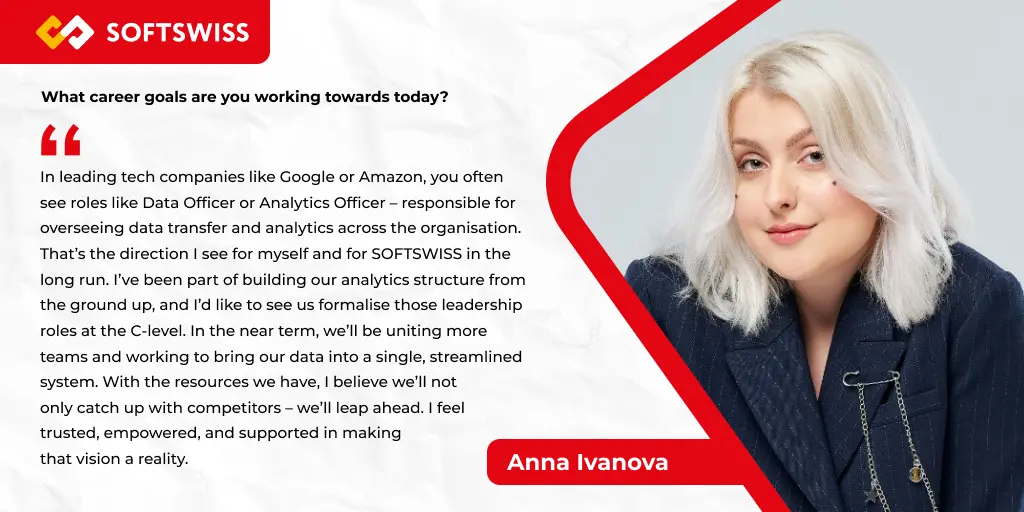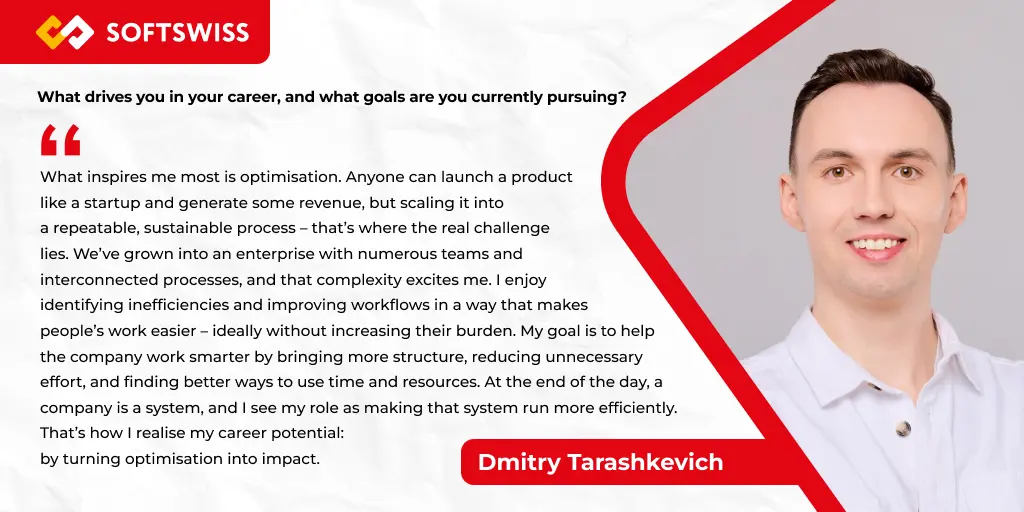Career growth is much more than just chasing the next job title. It’s about setting intentional career goals and aspirations, embracing new challenges, and making your professional journey meaningful for years.
In this article, we explore the meaning of career goals, their importance, and how to set and achieve them effectively. You will also find examples of career goals, practical strategies, and real-life success stories from SOFTSWISS employees, showing how personal goals and aspirations, with appropriate support, can lead to meaningful achievements.
What Are Career Goals – and Why They Matter
Career goals are often perceived through the lens of visible outcomes: higher compensation, a new title, broader responsibility. These are easy to recognise and, in many cases, socially reinforced – they signal success in ways that are difficult to ignore. Yet these outcomes are often mistaken for the goal itself, when in fact they are secondary.
What lies beneath is rarely as explicit. A goal that leads to long-term professional satisfaction is rarely defined by status or scale alone. It takes shape through more complex, internal questions: What kind of work matters? What values are worth translating into action? What does it mean to grow not only in skills, but in substance – as a person, a collaborator, a contributor?
These questions are foundational. Without them, a person may continue to move forward – accumulating experience, responsibilities, results – but in a direction that gradually loses clarity. Momentum can easily be misread as progress. Especially in tech, external change is often constant, which makes it possible to remain busy and effective while simultaneously growing more distant from any clear sense of why the work matters.
Over time, this distance can produce a kind of internal dissonance. The effort remains, and results may still follow, yet the emotional connection begins to fade. Motivation flattens, meaning dilutes, and decision-making becomes reactive rather than intentional. In this state, burnout does not arrive as a sudden collapse. It begins subtly, as work continues, but the reason behind it weakens.
Career goals, when grounded in honest self-reflection, offer a way to stay connected to direction. They transform aspiration into orientation – not a fixed destination, but a frame through which choices acquire coherence. This makes them useful not only at the level of vision but also in the immediate context of work. They can clarify which projects deserve attention, which opportunities resonate, and where effort is most likely to contribute to something that feels aligned.
When taken seriously, career goals are less about advancement and more about integration – making sure that movement, however fast or slow, reflects something deliberate. Career strategy preserves a sense of authorship and with it, it protects professionals not only against stagnation, but against a kind of success that arrives at the cost of self-connection.
Structuring Career Goals with Purpose
Strong career goals are never standalone. They work best as a connected system, where each level of planning supports the next, from long-term vision to everyday decisions. This structure ensures that actions taken today are part of something larger, helping to build progress and keep career development intentional.
- Long-term goals (5–10 years) represent the big-picture vision – who you want to become and what kind of impact you want to make. This could mean leading innovation in your field, launching a company, or shifting into a new domain.
- Mid-term goals (1–3 years) translate that vision into strategic steps. These might include developing specific expertise, trying a new role, expanding your network, or gaining experience in a particular area. These are the “building” years, where exploration and preparation happen.
- Short-term goals (3–12 months) bring focus to the present. These are practical, actionable priorities such as completing a course, leading a project, mentoring a colleague, or improving performance in a specific skill. Day-to-day decisions – what to say yes to and what to deprioritise – take their cue from this structure.
Each level reinforces the others when this kind of goal alignment is in place. Joining a new team means more than change. It should be a calculated step toward mid-term development, rooted in a long-term direction. Learning a new tool or speaking at an internal event is not just about productivity – but about shaping a future identity.
This approach helps professionals avoid fragmentation. Instead of treating opportunities and tasks as disconnected events, everything becomes part of a coherent path. And with that comes clarity, motivation, and a greater sense of meaning in the work.
Why Career Goals Matter for Employers
The value of career goals goes far beyond the individual. Organisations benefit just as much, often more than they expect. When employees have a clear sense of direction, their work becomes more intentional. Their development becomes easier to support because it is grounded in specific aspirations. Over time, this creates a more stable, better-aligned workforce – one where personal motivation reinforces business priorities, rather than pulling against them.
It’s not only about performance or retention. A clear internal focus changes how people show up. Growth that is connected to personal meaning tends to generate more resilience, more curiosity, and a stronger sense of ownership – all of which shape culture in ways that are hard to replicate through formal incentives alone.
At SOFTSWISS, this connection between individual direction and day-to-day work is part of how teams operate. We care, We excel, We push for customer success – these are not external expectations. These values come through in how problems are approached, how quality is maintained, and how people hold themselves accountable.
In this kind of environment, career growth happens through the work itself. Goals give structure to development, but progress comes through practice: the standards people apply, the decisions they take responsibility for, the expertise they build over time.
Examples of Common Career Goals: Growth Directions
Career goals can also be viewed through the lens of different types of growth. In addition to considering timeframes (long–, medium–, and short-term), reflecting on how your career can progress upward, laterally, or in greater depth can also be highly beneficial.
- Upward growth involves advancing in responsibility, leadership, and influence. An example could be moving into management, such as becoming a team lead responsible for project delivery and mentoring junior colleagues.
- Growth across focuses on broadening skills and experience by exploring new functions, departments, or industries and for example, transitioning from software development to product management can help gain cross-functional expertise.
- Deeper growth emphasises specialising and mastering a particular area. An example here might be becoming an expert in cybersecurity or cloud architecture.
Additionally, some professionals pursue integrative growth, aligning their work more intentionally with personal values and life balance, such as improving work–life harmony or seeking roles that reflect their identity.
Strategies: How to Set and Work Towards Career Goals
Setting professional goals goes far beyond making a list and ticking boxes. It is a process of thinking carefully about what we want, how we will get there, and how to adapt as things change. Here are five actionable strategies to help you effectively set and achieve career goals.
1. Start With Reflection
Take some time to think about what you enjoy, what energises you, and your strengths. Your goals should reflect what you truly want, not just what seems appropriate for the next step.
2. Use the SMART Framework
This is a widely used and standard method for structuring career goals. For example, instead of saying, “I want to grow as a leader,” a SMART goal might be, “I’ll lead a sprint planning session for my team by the end of next quarter.”

3. Break Bigger Goals Into Smaller Steps
Big goals can often feel overwhelming and out of reach. Break them into milestones, with each one providing a sense of progress. For example, if the goal is to become a product manager, start by identifying the key skills required for the role. If some are missing, focus on building them step by step.
4. Keep Track and Stay Flexible
Check in with yourself, your manager, or your mentor regularly. Goals should change as you learn more or as business needs shift. Being flexible doesn’t mean giving up – it means adjusting with purpose.
5. Make Your Goals Visible
Others are more likely to support you when your goals align with the company’s direction. Sharing your ambitions can open up opportunities, provide access to resources, and even attract sponsorship from leadership. A strong company culture is one of the most important factors supporting such actions. Read more about tech career growth at IT First Company.
Real Stories: Employees Who Achieved Their Career Goals
At SOFTSWISS, career development stands as a practical reality, not a theoretical ambition. To prove that, we spoke with our colleagues at different stages of their professional journeys and across various roles, each offering a unique perspective on how curiosity, ownership, and a supportive environment helped them turn ambition into tangible achievements.
Anna Ivanova, now the Head of the Data Office, joined SOFTSWISS at just 19, stepping into a team of experienced professionals. Starting in business account management, Anna soon discovered a deep interest in data, which quickly became a guiding force in her career journey.
With persistence and a clear vision, she went on to establish the company’s first data processes and played a key role in building a company-wide BI system. Today, Anna leads a 24-person team and combines all product analytics under one roof. This journey is a compelling example of how courage, curiosity, and the right environment can transform an unconventional start into a leadership role.

Dmitry Tarashkevich, Head of the TechOps Department, joined SOFTSWISS for a challenge and growth. He discovered the freedom to shape the role and the team from the ground up. Dmitry redefined the team’s focus, introduced automation to ease developer workload, and drove improvements with far-reaching impact.
Now leading a team of managers, Dmitry continues to streamline cross-functional processes and scale operational efficiency. According to Dmitry, true career fulfilment comes from turning complexity into clarity – and helping the business move faster, smarter, and more sustainably.

These two journeys reflect more than personal milestones – they underscore the importance of clear goals, mutual trust, and an environment that values initiative. With determination and the right mindset, meaningful career progress is within reach.
Bringing It All Together
Career goals require ongoing attention. Priorities shift, context changes, and what felt right a year ago might no longer apply. Revisiting goals means staying aligned with what matters, both personally and professionally.
At SOFTSWISS, we aim to support this process through a combination of practical tools – such as performance reviews, regular one-on-one meetings, access to learning, and internal mobility. These mechanisms help create an environment where people can reflect on their direction, explore new areas, and strengthen their capabilities with support along the way.
Progress, however, depends on shared effort. Tools only work when people use them intentionally, and when the company is ready to respond. When that balance is in place, development becomes steady, meaningful, and long-term, for both the individual and the business.
